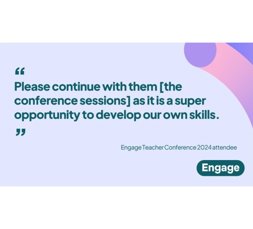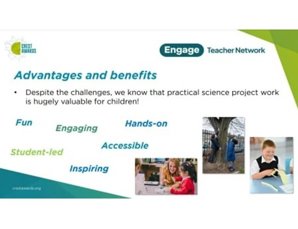Posted:
8 July 2024
Our Engage Teacher Conference 2024 round-up

Last month, we welcomed educators from our Engage Teacher Network to the annual online Engage Teacher Conference, as speakers and attendees. We are committed to supporting teachers in challenging circumstances to tap into the inspiration, resources, and assistance to transform access to relevant and meaningful science work for all children and young people. The conference is part of a wider programme of support offered by the British Science Association (BSA), and connects teachers to share and promote great practice in STEM* engagement in schools.
The Engage Teacher Network is 2000-strong community of educators working with children and young people most likely to be underrepresented in STEM; from lower socio-economic backgrounds, from ethnic minority backgrounds, attending schools in rural areas and with special educational needs.
If you missed the conference, all 13 sessions were recorded and are available to watch.

Teacher panels
The best ideas for engaging young people in STEM come from the teachers who are doing it effectively themselves; this year we offered sessions in a panel format, where teachers from the network fielded questions from other educators.
In the Accessible teaching for students with SEND session, attendees received brilliant tips and insights from a panel with experience in mainstream, alternative provision, and special schools, and also a home education setting.
Educators were encouraged to look into ‘integrated instructions’ for science practicals, the use of Widgets for learners with communication difficulties, Primary Science Teaching Trust resources, and the recently-published Inclusive and Accessible Secondary Science by Jane Essex.
Two teacher panel sessions – for primary and secondary – shared tops tips for doing CREST Awards with young people underrepresented in STEM. They covered questions about making space for CREST in the curriculum, the important of including young people with SEND, ordering CREST certificates in advance, and how CREST projects can be tailored to the specific interests of students. Most importantly, the teacher panels encouraged their peers to have fun and be flexible.
Check out the recording of the Making the most of British Science Week session – our expert educators had a wealth of suggestions to kick off planning for your first British Science Week; being inspired by the theme and getting other departments and the local community involved. Top tip? Start planning early...but even if you’re not able to, the British Science Week website and resources mean that you can still pull something together with a shorter lead in time!
Showcasing STEM resources
We brought together a fabulous bunch of organisations which offer free and accessible STEM resources, to help do our bit to connect educators with good quality science materials. For secondary, EngineeringUK’s Neon offer and new Climate Schools Programme were first up in the programme. Neon is a powerful portal to all sorts of activities and experiences related to STEM, so do take a look.
Attendees were also treated to a tour of the Explorify website! The session included suggestions on how to use it to spark curiosity and get primary pupils thinking and talking like scientists. Don’t miss the ‘What’s Going On’ activities that spotlight people who work in STEM professions; great for challenging stereotypes about what a scientist looks like!
Two further sessions welcomed organisations active in the STEM sphere to showcase their top free resources for schools, including My Science Club, The Royal Society, Science Museum Group, The Woodland Trust, and the UK Electronic Skills Foundation, along with our in-house CREST Awards experts. If you’re looking for ways to inspire your students’ love of science, bring more interactive practical science experiences to your classroom, or take science learning outdoors – this is the place to start!
The Unplastify Challenge for Schools might be just the thing for secondary teachers looking for a way to channel young people’s interest in the climate and connect them with like-minded peers globally – do check it out.
In the Including Careers in the Classroom session, NUSTEM’s Dr. Carol Davenport shared a collection of resources for including careers context to your science and maths lessons for young children, including a Curriculum Careers Tool and STEM Person of the Week. Linking to the STEM Attributes, these tools can be used to help children see that they already have the skills they need to work in STEM, if they want to!
Supporting young people with additional needs
There is considerable appetite from educators in the Engage community for guidance and resources suitable to deliver inclusive science in the classroom. We invited Em Diserens from the Lightyear Foundation to share her expertise on Making STEM Accessible, in which she modelled some approaches using the example of an astronomy lab.
As mentioned earlier, teachers in the Accessible teaching for students with SEND session shared advice and their favourite resources for inclusive science, too. And don’t miss the Explorify session, where Liz Hooper shared what’s on offer to support pupils with SEND in the Explorify Inclusion Hub.
CREST Awards
Following the panel events on CREST Awards, Maria Rossini, Head of Education at the BSA, spoke on how integrating CREST project work into the secondary curriculum delivers opportunities for young people to think and act like scientists and engineers. She discussed research that has shown that student motivation, resilience, and retention of knowledge was improved after doing CREST. An added benefit was a reduction in extra working hours happening outside of curriculum time for teachers and technicians.

For a whistle-stop tour of CREST for younger pupils, let our colleague Catherine Davies be your guide in her session Easy Practical Science for the Classroom, including a live demo of the Rocket Reach activity! As before, the experience of teachers who are already doing CREST is invaluable – hear what they have to say in the teacher panel CREST Top Tips sessions.
If your school is in need of financial support to run CREST Awards (or for your British Science Week ambitions) and you plan to apply for one of the grants we manage: the Application Tips for Kick Start Grant and Engage Grants session is a treasure trove of tips for submitting a solid application.
Other opportunities for STEM in schools
If you teach in a school in challenging circumstances, join our community to hear about events, opportunities and resources for schools like yours. You can join the network for free.
*STEM is an acronym for science, technology, engineering and maths
Thank you to all of the guest experts and educators who contributed to the 2024 Engage Teacher Conference and help contribute to a future where science is more relevant, representative, and connected to society.
